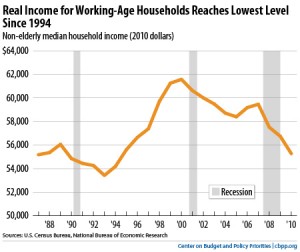From about 1991 to 2001, Japan suffered what is called its “Lost Decade,” as a result of steep declines in housing prices and the stock market.
During this period, commercial real estate prices fell by about 87%, accompanied by economic stagnation and deflation. This period saw the stock market decline by 60% between late-1989 and August 1992. By 2001, Japan had entered its “lost decade.”
In contrast, during the period when Japan’s housing bubble was inflating, the Imperial Palace in Tokyo was valued at more than the State of California. A cup of coffee cost $20. Those were Japan’s heady days.
Now, it looks like Europe is headed for its “Lost Decade.” Speaking on CNBC, James Shugg, senior economist at Westpac, said the austerity measures being introduced in Europe will reduce their standard of living.
“These reforms are going to be devastatingly impacting on the population in these countries,” Shugg said. “We are looking at a decade of lost living standards across most of Europe. The austerity measures are part of the solution but they are also going to deepen the downturn.”
He added that countries would be facing a prolonged period of hardship because tax revenues would also be hit. There is no easy solution to this, it will be hugely painful,” he said.
Another economist, Robert Parker, senior advisor at Credit Suisse, questioned whether a solution even existed. Proposals, such issuing more Eurobonds, would not even begin to solve the current European debt crisis. While talk continued of Europe’s “Lost Decade,” the lingering effects of lower tax revenues throughout Europe would create more cuts years after European economies even begin to recover, Parker said.
Lessons for the U.S.
While America’s “Lost Decade” economic discussion has not gone mainstream, it has started to smolder in discussions among investors, the general public, academics and economists.
Referring to the current recession brought on by the housing fraud and inflated prices, Paul Krugman, a New York Times columnist, said “things in the United States have already gone much, much worse than they ever did in Japan.”
According to Krugman, “Japan never had the kind of drastic slump in employment that has afflicted the United States.”

The economy’s other serious problem is frozen lending practices. According to Richard Koo, chief economist for the Nomura Research Institute, a Japanese think tank, the Federal Reserve’s quantitative easing actions have failed to spur economic growth.
In an October 2011 interview, Koo said:
“By taking the new Treasury supply away, it forced the private sector to put its money into equities, commodities, or real estate. With real estate in a tailspin, the money went to commodities and equities on the assumption that the economy or profits would pick up. The effect was to push stock prices to higher levels than could be justified by genuine cash flow or corporate growth. Now, with fiscal stimulus disappearing and GDP growth slowing, people have realized that equity prices are essentially overvalued, and that is the correction we are currently seeing.”
This may help explain the current run-up in commodities prices, and why that asset class may be forming a bubble. It also does not bode well for the important residential real estate market, which serves as an engine for building retirement wealth. With that asset unable to generate returns, Americans have lost a major source of paying for their lifelong needs.
For individual investors, America’s Lost Decade, at least in terms of stock market returns, is a matter of record. Top Portfolio Manager Bill Miller of the T. Rowe Value Trust fame, beat the S&P 500 index for 15 years before his luck ran out and his fund went into the red. The average investor in that fund lost money, even though Miller beat the index for 15 years. That was an admirable record, but success is fleeting in the investment business. The longer you stay in the game, the greater the odds of leaving a loser.
Solutions to the Global Crisis?
As far as possible solutions, economists and market commentators have no shortage of suggestions or verbiage on finding a solution to Europe’s debt crisis. The problem: managing the political-economy is what nation-states are all about, and the raw rivalries in Europe, dating back to the 1800’s, remain visible today.
Seeking Alpha, a site aimed at high-end investors and would-be or actual hedge fund investors, suggests that the IMF, World Bank, Fed European Central Banks and other global monetary authorities “get away from more bailout talks” and address ways to revalue the Eurodollar, monitor the progress in emerging markets, and a grandiose effort to “promote growth in advanced economies.”
While these are all grandiose suggestions, which involve global monetary authorities which are not transparent and have conflicted goals, the Seeking Alpha site also warns that if these suggestions fail, “we’re destined for 10 more years of volatile markets, high unemployment rates and snail-pace growth.”
So if you are an average investor today and a witness to the political gridlock in Washington, would you bet on global banks to solve today’s very serious global problems?
Don’t worry: That’s a rhetorical question. I wouldn’t either.










